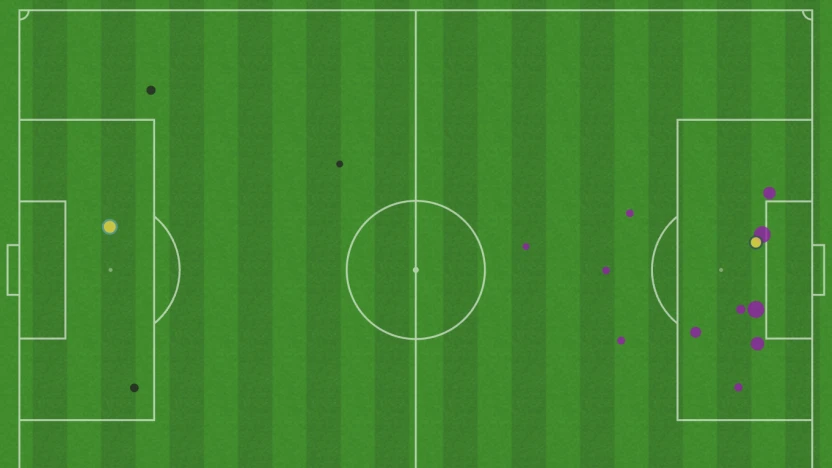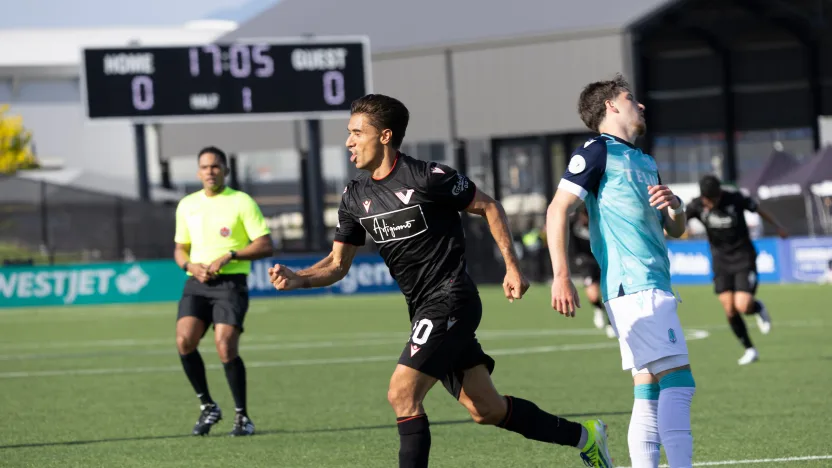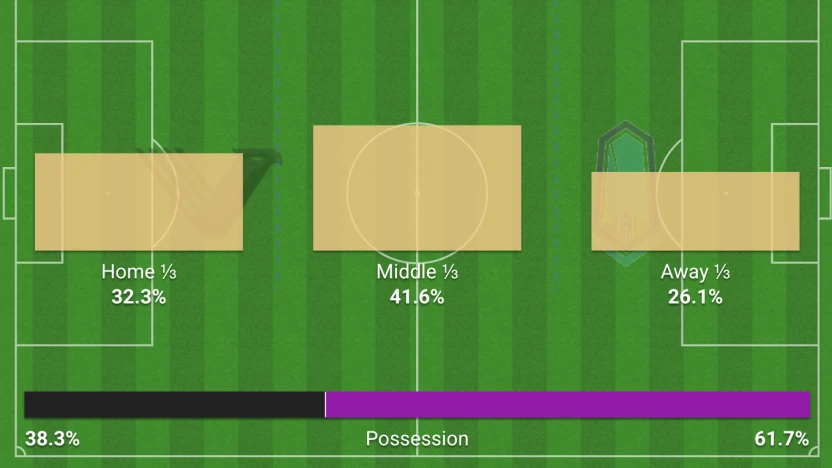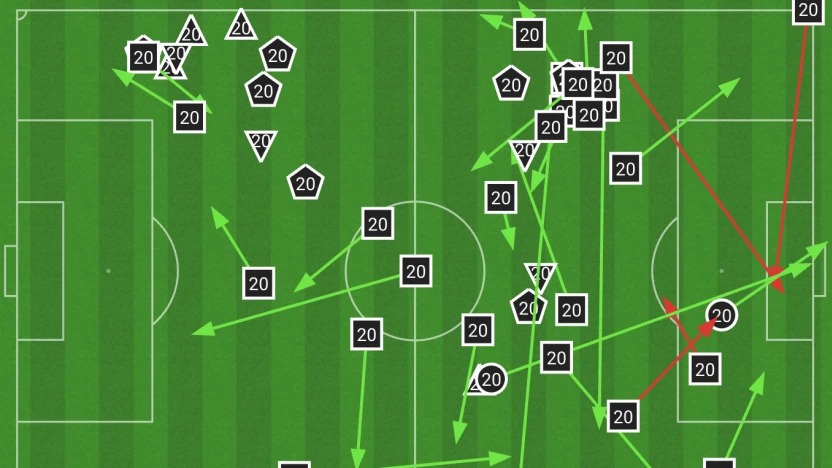Final Score: Vancouver FC 1-1 Pacific FC
Goalscorers: Mezquida 18′; Ndom 70′
Game of the 2025 season: 14
CPL Match: 610
Match in a minute or less
For the first time ever, the Salish Sea Derby has ended in a draw, as Vancouver FC and Pacific FC were forced to share the spoils following a 1-1 draw at Willoughby Community Park on Saturday.
Vancouver opened the scoring in the 18th minute, as Nicolás Mezquida scored his second goal in as many games for VFC, slotting home after a nice through ball from Terran Campbell, who had intercepted a pass just moments earlier to earn possession.
From there, however, the game changed in the 51st minute, as Vancouver’s Kunle Dada-Luke was sent off in his first match against his old team, putting the hosts down a player for the rest of the evening.
Pacific would eventually take advantage of that advantage, too, and found a 70th-minute equalizer, as Marco Bustos picked out Aly Ndom with a great cross, and Ndom would make no mistake with his header from close range.
Then, despite a late push from Pacific, Vancouver would hold on the rest of the way, however, leaving both teams to settle for the draw in the end.
Three Observations
Vancouver continues to show improved defensive organization:
Despite a positive performance last week, Vancouver made some slight changes to their team heading into this one, as they welcomed back midfielders Vasco Fry and Mehdi Essoussi, who both missed the last two games – Fry through suspension, Essoussi through schooling commitments.
Given that Vancouver was light on midfielders in those two games that the pair missed, they didn’t hesitate to drop them right back into the starting XI, and understandably so.
While the personnel changed, however, the set-up didn’t, as Vancouver stuck with the 4-2-3-1 that worked to great effect in their draw vs. Cavalry. Not only that, but the insertion of Fry and Essoussi gave Vancouver a new layer in midfield, too, as they added defensive solidity to their double-pivot, offering more protection to their back four, which looked slightly different as David Norman Jr. slotted into centre back to replace an injured Allan Enyou.
Then, on the ball, Vancouver stuck with a 3-4-3 in build-up, with Essoussi often dropping back into Vancouver’s backline to help form the three, and Emrick Fotsing tucking in from the left wing to support Fry in midfield. From there, the goal was to provide service to the front three of Nicolás Mezquida, Alejandro Díaz and Terran Campbell, with Mezquida dropping deeper than his two forwards to support the midfield.
Through that, Vancouver were able to put in another solid performance on both sides of the ball. If not for the red card, they seemed likeliest to grab a result, especially due to their defensive work, as they kept Pacific to just two shots and 0.16 xG in the first half, as they were airtight even while defending their early lead.
Now, the next step for Vancouver will be to take the same level of organization they’ve shown defensively, and translate it over to their attack, as even despite scoring, they’ll feel they could’ve been better in that area than they were, finishing with just four shots and 0.21 xG in the game.
In particular, they want to be more dangerous when they’re building up, as both of their goals over the last two weeks have come from moments where they’ve won the ball high up the pitch, capitalizing on other teams’ mistakes. While that’s not a bad thing, as they want to be a team that presses more aggressively and forces mistakes like that, they also want to take more risks with the ball, something they feel they didn’t do enough of in this game.
Yet, given the players they have at their disposal, they feel it’s a matter of time before their attack gels and starts putting together those sequences, which they had a few of in this game, as they just need to keep building chemistry.
Given how worrying their defensive play was in the first two weeks of the season, in which they conceded six goals in two home games, it seemed like the attack would be the least of their worries going forward – now, thanks to the last few weeks, they’ve started to quell that main problem, and will now shift their attention to being more dangerous on the ball, something that they’ll hope only gets better as they try to translate that defensive organization into their attack.

Frustrations mount as Pacific searches for answers in attack:
Unfortunately, it ended up being an evening that Pacific has gotten used to having over the last few years – they just never seemed to get going in the attack, and when they did get to the final third, they lacked the execution required.
Then, more frustratingly, they made things hard for themselves on the goal they conceded, where they gave away the ball cheaply in an extremely dangerous position, which was always going to be costly given the players that Vancouver has on the field. That, in particular, will frustrate them as they pride themselves on being a good defensive team that doesn’t give up cheap goals.
Yet, that’s been the story of Pacific’s last three games, in which they’ve now only amassed one point. Little mistakes are costing them at both ends of the field, and they’re paying for it, something that’s starting to frustrate them.
When looking at the balance of the 270 minutes they’ve now played since an opening day victory over Valour, they’ve been pretty solid for the most part – they struggled a bit against Forge, were pretty good against Halifax, and were somewhere between that in this match against Vancouver.
In each of those three games, however, ley moments cost them, as they gave up two set-piece goals and werne’t dangerous enough offensively in a 2-0 loss to Forge, didn’t capitalize on a litany of scoring chances and made key errors on each of the goals they conceded in a 3-1 loss to the Wanderers, and had their mistake on Vancouver’s goal in this draw.
For a team that is struggling to find its offensive identity, those mistakes have seemed to add up, as it’s put pressure on their attack to find goals that aren’t falling for them right now.
Because of that, it feels like this is a pivotal moment for Pacific. A trip to a red-hot Atlético Ottawa awaits next week, as things don’t get any easier for them now.
There’s no doubt that Pacific can go out and give Ottawa a good game – it’s not as if they’ve looked completely out of sorts in these matches where they’ve dropped points – but they’ll know that their execution is going to need to be much better than it’s been, something they’ve struggled with.
Perhaps, however, the frustrations from this game can help them fix that – at the end of the day, sometimes you need to make mistakes to learn from them, so Pacific will look to take those errors and use them as motivation for next week’s big match.

Red card offers good learning lessons for both:
No matter the situation, red cards always change matches – for better or for worse.
Because of that, it was a good test for both teams – given that Vancouver had been the stronger of the two teams to start the match, while Pacific had struggled to find the energy required, it felt like Kunle Dada-Luke’s 51st-minute red card was going to put all sorts of pressure on each side the rest of the match.
For Vancouver, it was going to test their defensive resolve, as they were sure to deal with a Pacific wave of pressure down a player, making them work for a result. After a good start to the match, it was a surprise bit of adversity, right at a bad time – yet, it was also an opportunity for their players to rise to the occasion, showing that they could rise through a tough moment and stick to their newfound defensive identity while doing so.
As for Pacific, this was a huge test of their attack, given that they’d looked far from their best in the final third, having struggled to put Vancouver under pressure before that red card. For a team that scored just once in the last two games after a two-goal outburst on opening day, this was a chance for them not just to prove they could score, but also to build some confidence.
In the end, both teams passed their respective tests, sort of.
Vancouver will be frustrated that they conceded, as they felt they started to sit back too deep after the red card, but they still defended well given that they kept Pacific to just 0.77 xG on the night – and of Pacific’s 11 shots that came after the red card, just one was worth more than 0.1 xG. Given how they could’ve easily capitaluated after the red card, which derailed an excellent 50 minutes of play, that’s not bad at all.
Then, with Pacific, they’ll take solace in the fact that they at least rescued a point from their late push – had they lost, it would’ve felt catastrophic given the stakes of this match.
Plus, they’ll now have 40 minutes of footage where they dominated the ball to dive into, which might help them figure out why they weren’t able to generate enough dangerous chances late despite holding 72.7% of possession in the second half, and help them find a solution to be more dangerous in opposing boxes. Especially after a night where they turned all of their possession into just 23 touches in the box on the day, this will also help them figure out how to get the ball into the box more often, which might help those attack woes.
Overall, both teams will leave frustrated with how this ended, no doubt, but those learning lessons could prove to be valuable, for different reasons.
Plus, as a bonus, it’s important to remember that both teams play each other in less than two weeks time in the Canadian Championship – there’d be no better time to take those lessons and apply them than in a do-or-die knockout match.
Given how feisty this match was, as it ended up being one of the more chippy derbies in recent memory, that’s never a bad thing, especially from a neutral perspective – even if both teams won’t be thinking about that as they stew in their frustrations of leaving points on the table in this one.

What They Said
“We have found the right balance, especially in our defensive structure, and we’re getting more consistent performances from our defenders and our midfielders. I also think defending is always about how you defend as a team, and that starts from the front, putting pressure on the ball, making it difficult for them to play between lines and with their strikers.” — Vancouver FC head coach Afshin Ghotbi
“The first half we weren’t good enough, I thought we were poor. Then the red card changes the game, but still, in the second half we were very slow, it was stop, start, stop, start, a lot of free kicks, a lot of throws, and there was no flow, which made it very difficult. Yes, we went up a player, and we can be better in that situation… but it felt like it was stopping every minute, so it made it hard to establish flow and ryhthm in the game.” — Pacific FC head coach James Merriman
CanPL.ca Player of the Match
Nicolás Mezquida, Vancouver FC
Mezquida has already proven to be an important calming force in Vancouver’s attack, and he showed off that composure on his goal, his second in as many games.
He was also good on the ball, too, completing 21 out of 24 passes (88%), adding two shots, completing two dribbles and two long balls, while chipping in with one tackle, four recoveries and winning six out of 15 duels defensively.

What’s next?
Vancouver will head out on the road for their next match, as they’ll travel to Winnipeg to take on Valour FC at Princess Auto Stadium on Saturday, May 3rd (4 p.m. PT/6 p.m. CT). Meanwhile, Pacific will head to Ottawa to take on Atlético Ottawa at TD Place earlier that same Saturday (10 a.m. PT/1 p.m. ET).
Watch all CPL matches live on OneSoccer. In addition to its website and app, OneSoccer is now available on TELUS channel 980 and on Fubo TV. Call your local cable provider to ask for OneSoccer today.








